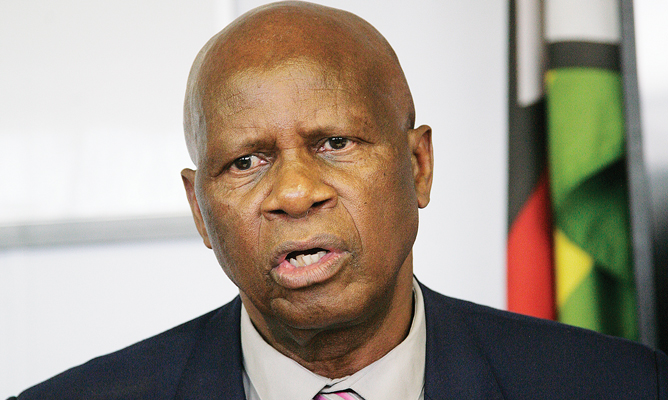
FINANCE minister Patrick Chinamasa says the country has too much dead capital in relation to housing and that homeowners must use their houses to borrow money to start businesses to support the economy.
BY TATIRA ZWINOIRA

Speaking at the launch of the People’s Own Savings Bank (POSB) mortgage financing in Harare yesterday, Chinamasa said the country did not appreciate that they were the most empowered on the continent.
“Most of the houses, which are coming up or which are already in existence, there is no borrowing or lending (mortgage). They are otherwise unencumbered and that basically means we have plenty of dead capital, which we need to utilise and leverage in order to develop our country. So that is another piece of homework I would want to give to you,” he said.
“What I am saying here is that even if you have dead capital, there is no reason why you should not leverage that asset to borrow and start a business. We have to change from the mindset where we think businesses and companies are going to be formed by people, who are not us, that someone else is going to start businesses.
“It is us, here, who are going to start the business and if we have got an asset, a house or an extra house, please use it and leverage it to raise capital to start businesses that would be the message I would want to leave with you.”
In this regard, Chinamasa said he was willing to forego some of the immediate taxes in anticipation of the housing industry rebounding to optimum levels.
“We also have a lot of titled land which is also dead capital, as you know, and I do not think Zimbabweans appreciate that they are the most empowered people on the continent. All of you here have houses, which have no mortgage and you are not leveraging that asset either to start your businesses or to go into entrepreneurial activities,” he said. “The fact that you are not using that land, those assets, it means they are dead, you are not utilising them.”
- Chamisa under fire over US$120K donation
- Mavhunga puts DeMbare into Chibuku quarterfinals
- Pension funds bet on Cabora Bassa oilfields
- Councils defy govt fire tender directive
Keep Reading
In his mid-term monetary policy statement, Reserve Bank of Zimbabwe governor, John Mangudya said credit to the private sector recorded a modest growth of 1,99%, to $3,49 billion in May 2017 from $3,42 billion in May 2016.
By March 2017, loans and advances declined to $3,59 billion by March 2017 from slightly over $4 billion recorded over the same time frame last year.
The decline was largely attributable to prudential and cautious lending by banks as well as acquisition of non-performing loans by the Zimbabwe Asset Management Corporation.
Chinamasa’s appeal comes as salary backed loans accounted for a large portion of the loan book, which was 28,8%, followed by agriculture and distribution at 16,7% and 15,4%, respectively.
Local Government and National Housing deputy minister Christopher Chingosho said banks needed to reduce interest rates to below 10% for Chinamasa’s suggestion to work.











